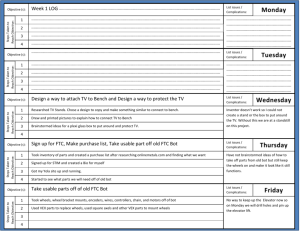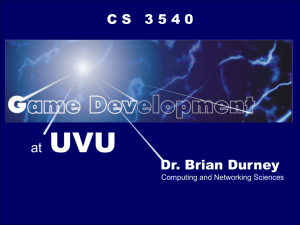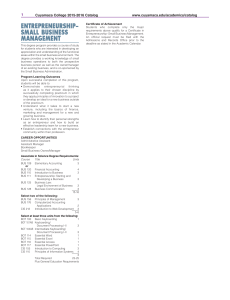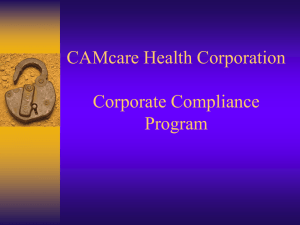BSc (Hons) Occupational Therapy - SC402 (Under Review)
advertisement
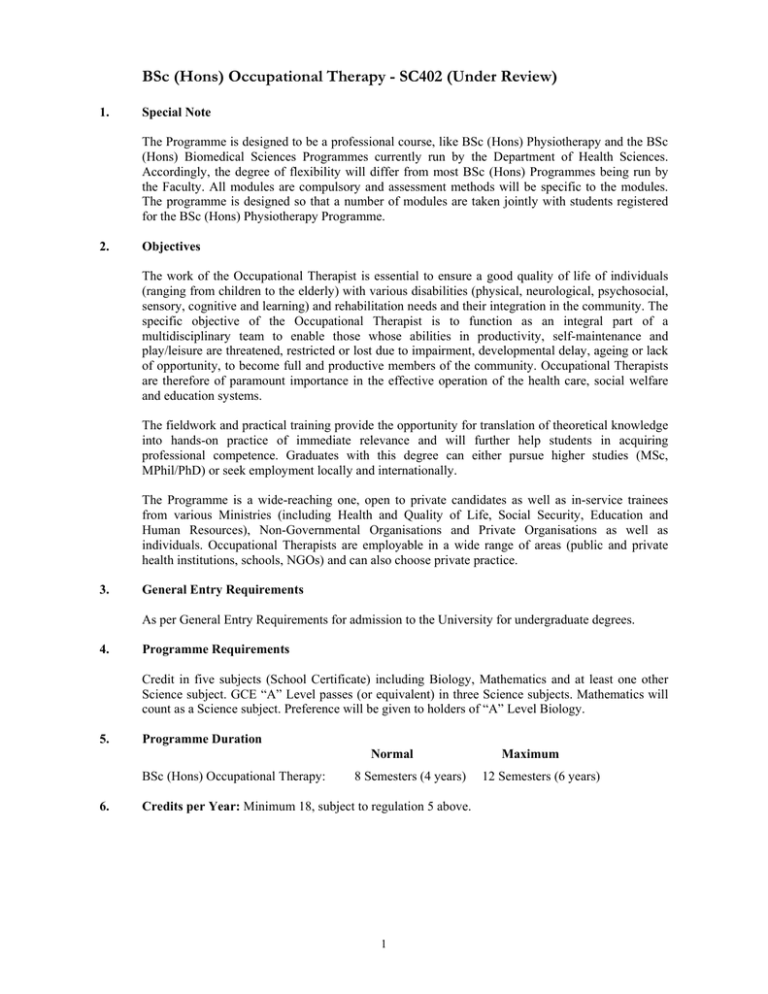
BSc (Hons) Occupational Therapy - SC402 (Under Review) 1. Special Note The Programme is designed to be a professional course, like BSc (Hons) Physiotherapy and the BSc (Hons) Biomedical Sciences Programmes currently run by the Department of Health Sciences. Accordingly, the degree of flexibility will differ from most BSc (Hons) Programmes being run by the Faculty. All modules are compulsory and assessment methods will be specific to the modules. The programme is designed so that a number of modules are taken jointly with students registered for the BSc (Hons) Physiotherapy Programme. 2. Objectives The work of the Occupational Therapist is essential to ensure a good quality of life of individuals (ranging from children to the elderly) with various disabilities (physical, neurological, psychosocial, sensory, cognitive and learning) and rehabilitation needs and their integration in the community. The specific objective of the Occupational Therapist is to function as an integral part of a multidisciplinary team to enable those whose abilities in productivity, self-maintenance and play/leisure are threatened, restricted or lost due to impairment, developmental delay, ageing or lack of opportunity, to become full and productive members of the community. Occupational Therapists are therefore of paramount importance in the effective operation of the health care, social welfare and education systems. The fieldwork and practical training provide the opportunity for translation of theoretical knowledge into hands-on practice of immediate relevance and will further help students in acquiring professional competence. Graduates with this degree can either pursue higher studies (MSc, MPhil/PhD) or seek employment locally and internationally. The Programme is a wide-reaching one, open to private candidates as well as in-service trainees from various Ministries (including Health and Quality of Life, Social Security, Education and Human Resources), Non-Governmental Organisations and Private Organisations as well as individuals. Occupational Therapists are employable in a wide range of areas (public and private health institutions, schools, NGOs) and can also choose private practice. 3. General Entry Requirements As per General Entry Requirements for admission to the University for undergraduate degrees. 4. Programme Requirements Credit in five subjects (School Certificate) including Biology, Mathematics and at least one other Science subject. GCE “A” Level passes (or equivalent) in three Science subjects. Mathematics will count as a Science subject. Preference will be given to holders of “A” Level Biology. 5. Programme Duration Normal BSc (Hons) Occupational Therapy: 6. 8 Semesters (4 years) Credits per Year: Minimum 18, subject to regulation 5 above. 1 Maximum 12 Semesters (6 years) 7. Specifications Professional Training in the form of fieldwork in MoH hospitals and other public/private institutions will form an essential part of the professional programme. Fieldwork will be undertaken during Professional Practice modules. Permission has been obtained from the Ministry of Health and Quality of Life for students to use existing facilities for practical work and fieldwork. Formal lectures will be scheduled over three days a week and another two days a week will serve for selfstudy and practicals/fieldwork. 8. Assessment Continuous and Written Assessment of Modules The pass mark will be 50% for all modules. Each module will carry 100 marks (i.e. expressed as %) and will be assessed yearly as follows: 8.1 Written exams Modules will be examined at the end of the year in which they are taught. The Foundation modules in year 1 carry no credits. The following modules will be assessed by a 2-hr written exam paper: Year 1 BOT 1112; HLS 1112; HLS 1122; HLS 1212; HLS 1221; HLS 1231; BMS 1121; HLS 1242. Year 2 BOT 2112; BOT 2121; BOT 2212; BOT 2222; BOT 2232; HLS 2112; HLS 2212. Year 3 BOT 3112; BOT 3122; HLS 3212. The following modules will be assessed by a joint 3-hr written exam paper: Year 2 HLS 2122 and HLS 2222. The following modules will be examined by a 3-hr written exam paper: Year 1 BOT 1011Y. Year 3 BOT 3011Y; BOT 3012Y. Year 4 BOT 4011Y 2 8.2 Professional Practice/Fieldwork Fieldwork is distributed throughout the curriculum. To ensure a depth of learning, fieldwork will be guided and workplace skills assessed by a learning contract (an agreement about the particular knowledge, skill, or attitudes the student will develop as well as the roles and responsibilities of the student) and supervised and assessed by an occupational therapist preferably with at least three years’ experience or an occupational therapy educator. The student has to demonstrate that s/he has achieved the learning specified in the learning contract in the form of a concise student-prepared log book and a supervisor’s report in the form of a structured questionnaire, summarising and rating the work training and experience based on a list of all therapeutic techniques used and skills acquired. Both log book and report will be signed by the immediate work supervisor. These will have to be submitted to the professional practice/fieldwork co-ordinator (to be identified) and to the UoM programme co-ordinator at the end of each relevant semester. Students will need to submit a satisfactory log book (Grade S) and obtain a satisfactory report (Grade S) in order to be awarded a Honours Degree in Occupational Therapy with professional standing. Unsatisfactory reports and unsatisfactory logbooks will be awarded Grade U. Professional Practice 1: students spend 2 mornings/week in a variety of settings during which Satisfactory Attendance is required. Professional Practice 2-7: students are progressively required to assess and treat patients and apart from Satisfactory Attendance they are assessed by a formal clinical exam at the end of each semester where the essential knowledge, skills and attitudes for competent practice will be assessed. In years 2, 3 and 4 the clinical exam will carry a weighting of 70% of the total marks for each of these modules with continuous assessment counting for the remaining 30% of the marks. 8.3 Practical work and Continuous Assessment for modules (except Professional Practice) ¾ Modules including a practical component There will be no practical exams. Practical work will be assessed on a continuous assessment basis and will carry a weighting of 50% of the total marks awarded for the respective modules involved. The pass mark for the continuous assessment of practical work will be 50%. Continuous assessment for the theory part of modules having a practical component may be in the form of assignments and should include at least one class test and will carry a weighting of 10% of total marks for the module. ¾ Modules not including a practical component Continuous assessment for modules not including a practical component may be in the form of assignments and should include at least one class test and will carry a weighting of up to 30% of total marks for the respective modules. 3 9. Grading Structure This will be as shown below taking into account that the pass mark for all modules is 50%. GRADE POINT AVERAGE (GPA) Under the GPA, the following letter grades and their grade point equivalent are used: Letter Grade A+ A AB+ B C F 10. Grade Point 4.00 3.00 2.00 0 Percentage Mark 90 ≤ x ≤ 100 80 ≤ x < 90 70 ≤ x < 80 65 ≤ x < 70 60 ≤ x < 65 50 ≤ x < 60 x < 50 Classification of Award The degree classification will be based on the CPA at the end of the Programme as follows: CPA (%) ≥ 70% 60 ≤ x < 70 50 ≤ x < 60 < 50 11. CLASSIFICATION 1st Class nd 2 Class 1st Division 2nd Class 2nd Division No Award with Honours Repeat and Termination of Registration If the CPA of a student is < 50 for an academic year, the student will have to repeat the entire academic year, and retake modules as and when offered. However, s/he will not be required, if s/he wishes, to retake module(s) for which Grade C or above has been obtained. Students will be allowed to repeat only once over the entire duration of the Programme of Studies. Registration will be terminated if the CPA of the student remains below 50 at the end of an academic year and the student has already repeated one year of study. A student’s registration will lapse at the end of the semester in which s/he has successfully completed the minimum requirements for the award of the degree. 12. Restrictions (a) A student who repeats a module must submit new assignment(s), take part in the class test and re-write the examinations. (b) A student will not be allowed to retake a module in which s/he has already achieved a C grade or above. (c) Students who fail in up to 2 modules, will be allowed to proceed to the following year if their CPA ≥ 50, and clearing the failed modules with the next cohort of students. However, students will not be allowed to take follow-up Professional Practice modules. Students who fail in more than 2 modules, will repeat the year. 4 13. Modules of Special Nature Audit Modules Students who wish to follow specific module(s) or are advised to do so by the Department may audit same. Such Audit modules are not examinable but will appear in their transcript subject to satisfactory attendance (Grade S). 14. Professional Training A minimum of one thousand hours are required as per WFOT, five hundred (500) of which must be full time in the field. In this programme, fieldwork is divided as follows: • Professional Practice 1: Observation and Orientation: 90 hrs Assessment and treatment under direction (part time) in the modules of Occupational Therapy: Neurology, Neuro Musculo Skeletal/ Surgical/ Orthotics, Mental Health, Paediatrics and Cognition, and in the modules (i) Gerontology & Volition and Action, and (ii) Rehabilitation 180 hrs • • • 15. Professional Practice 2 and 3 Professional Practice 4 and 5 Professional Practice 6 and 7 360 hrs 420 hrs 540 hrs Total Professional Training/Fieldwork: 1590 hrs List of Modules Code Module Name Hrs/Yr L/P Credits Foundation Course in Biology Foundation Course in Physics 60/30 60/30 - Health in Society 1 IT and Communication Skills for Health Sciences Introduction to Human Anatomy and Physiology Therapeutic Media Occupational Therapy (Foundations for Practice) 30/30 30/30 45/0 30/30 45/0 3 3 3 3 - Health in Society 2 Cardiovascular System Skeletal and Locomotor Systems Psychology for Health Professions Occupational Therapy (Foundations for Practice) Professional Practice 1 30/30 30/30 30/30 45/0 45/0 0/90 3 3 3 3 6 1 Year 1 (Optional Modules as per individual requirement) BMS 1011 BMS 1012 Semester 1 HLS 1112 HLS 1122 BMS 1121 BOT 1112 BOT 1011Y Semester 2 HLS 1212 HLS 1221 HLS 1231 HLS 1242 BOT 1011Y BOT 1222 5 Semester 3 HLS 2112 HLS 2122 BOT 2112 BOT 2121 BOT 2133 Health in Society 3 Nervous System 1 Psychiatry Gerontology & Volition and Action Professional Practice 2 30/30 45/0 45/0 35/20 0/180 3 3 3 3 3 Basic Pathology Nervous System 2 Occupational Science Occupational Therapy (Mental Health) Therapeutic Communication and Group Dynamics Professional Practice 3 45/0 45/0 45/0 35/20 30/30 0/180 3 3 3 3 3 3 Kinesiology Occupational Therapy (Neurology) Occupational Therapy (Neuro musculo skeletal/ Surgical/ Orthotics) Rehabilitation Professional Practice 4 40/10 35/20 35/20 3 3 - 35/20 0/210 3.5 Health Research Methods Occupational Therapy (Neuro musculo skeletal/ Surgical/ Orthotics) Rehabilitation Professional Practice 5 45/0 35/20 3 6 30/30 0/210 6 3.5 Research Project Occupational Therapy (Paediatrics and Cognition) Professional Practice 6 35/20 0/270 4.5 Research Project Occupational Therapy (Paediatrics and Cognition) Professional Practice 7 35/20 0/270 10 6 4.5 Semester 4 HLS 2212 HLS 2222 BOT 2212 BOT 2222 BOT 2232 BOT 2233 Semester 5 BOT 3112 BOT 3122 BOT 3011Y BOT 3012Y BOT 3113 Semester 6 HLS 3212 BOT 3011Y BOT 3012Y BOT 3213 Semester 7 BOT 4000 BOT 4011Y BOT 4112 Semester 8 BOT 4000 BOT 4011Y BOT 4212 6 13. Programme Plan - BSc (Hons) Occupational Therapy Semester 1 Semester 2 Code Module Name Code Module Name BMS 1011 or BMS 1012 HLS 1112 HLS 1122 Foundation Course in Biology or Foundation Course in Physics Health in Society 1 IT and Communication Skills for Health Sciences Introduction to Human Anatomy and Physiology Therapeutic Media Occupational Therapy (Foundations for Practice) BMS 1011 or BMS 1012 HLS 1212 HLS 1221 Foundation Course in Biology or Foundation Course in Physics Health in Society 2 Cardiovascular System HLS 1231 Skeletal and Locomotor Systems HLS 1242 BOT 1011Y Psychology for Health Professions Occupational Therapy (Foundations for Practice) Professional Practice 1 BMS 1121 BOT 1112 BOT 1011Y BOT 1222 Semester 3 Semester 4 Code Module Name HLS 2112 HLS 2122 BOT 2112 BOT 2121 Health in Society 3 HLS 2212 Nervous System 1 HLS 2222 Psychiatry BOT 2212 Gerontology & Volition and BOT 2222 Action Professional Practice 2 BOT 2233 BOT 2232 BOT 2133 Code Semester 5 Module Name BOT 3112 BOT 3122 Kinesiology Occupational Therapy (Neurology) Occupational Therapy (Neuro musculo skeletal/ Surgical/ Orthotics) Rehabilitation Professional Practice 4 BOT 3012Y BOT 3113 Basic Pathology Nervous System 2 Occupational Science Occupational Therapy (Mental Health) Professional Practice 3 Therapeutic Communication and Group Dynamics Semester 6 Code BOT 3011Y Module Name Semester 7 Code Module Name HLS 3212 Health Research Methods BOT 3011Y Occupational Therapy (Neuro musculo skeletal/ Surgical/ Orthotics) Rehabilitation Professional Practice 5 BOT 3012Y BOT 3213 Semester 8 Code Module Name Code Module Name BOT 4000 BOT 4011Y Research Project Occupational Therapy (Paediatrics and Cognition) Professional Practice 6 BOT 4000 BOT 4011Y Research Project Occupational Therapy (Paediatrics and Cognition) Professional Practice 7 BOT 4112 BOT 4212 7 14. Outline Syllabus It must be borne in mind that the contents as set out form the basis for external approval for the programme, which enables students to practise as fully fledged health professionals. This implies that, although the contents can be seen as a guideline, they should be seriously taken into account. BMS 1011 - FOUNDATION COURSE IN BIOLOGY This module will be equivalent in level to Biology A level and will be compulsory for students not holding A levels in Biology. The A level syllabus (Core subjects + relevant electives) prevailing at the time the module is being taught will be adopted. Includes a practical component. BMS 1012 - FOUNDATION COURSE IN PHYSICS This module will be equivalent in level to Physics A level and will be compulsory for students not holding A levels in Physics. The A level syllabus (Core subjects + relevant electives) prevailing at the time the module is being taught will be adopted. Includes a practical component. BMS 1121 - INTRODUCTION TO HUMAN ANATOMY AND PHYSIOLOGY Introduction to human anatomy: anatomical terminology and topography. The endocrine system. The central and peripheral nervous system. The gastrointestinal system: nutrition and digestion. Structure and function of circulatory system: heart, blood vessels, lymphatics, lymph nodes, spleen. Control of Heart Beat and the Cardiac cycle. Structure and function of kidneys: excretion and osmoregulation. Mechanism and control of breathing. Control of growth and reproduction in man. Support, movement and muscle contraction: major muscle groups, ultrastructure of skeletal muscle, contractile mechanisms, skeleton, hard connective tissue. Integument: structure and function of skin, buccal cavity, teeth. General principles and social aspects of human health and disease: diet, gaseous exchange, exercise, drugs, infectious diseases. Fundamentals of the immune system and immune responses. Immune regulation. Autoimmune diseases. BOT 1112 - THERAPEUTIC MEDIA Ergonomics. Work study – methods improvement and work measurement. Practicals: Crafts and creative activities Domestic activities Recreational activities BOT 1011Y - OCCUPATIONAL THERAPY (FOUNDATIONS FOR PRACTICE) Definition of occupational therapy; the place of occupational therapy in the health care system; the occupational therapy process; the tools of practice; the different roles of the occupational therapist; history of the profession; recipients of occupational therapy; professional ethics. International Classification of Functioning, Disability and Health (ICF) and the place of occupational therapy in this model; Generic approaches in health care: biomedical, bio psychosocial and occupational foundation for therapy. Study and application of the Canadian Occupational Performance Measure. Introduction to other assessments in Occupational Therapy. BOT 1222 - PROFESSIONAL PRACTICE 1 Observation and orientation to different areas of occupational therapy fields of practice: physical rehabilitation, mental health and paediatrics. This will preferably take place in the mornings. HLS 1112 - HEALTH IN SOCIETY 1 The three broad themes in this module are: • Health • Family (This includes a Family Study project on the impact of a child with disability in the family) • Normal human development Health: different views on the meaning of health. Family: an introduction to the functions of the family, factors that influence family life in Mauritius. Normal human development, including sexuality: the developmental stages in life – infancy, childhood, adolescence, adulthood and old age. An overview of motor, emotional, psychological development through the stages of development. 8 HLS 1122 - IT AND COMMUNICATION SKILLS FOR HEALTH SCIENCES Introduction to computers. The role and impact of IT and computers in modern society. Principles of written communication; academic writing skills. Principles of oral communication. Practical (computer) skills: (i) word processing; (ii) designing and orally delivering an academic presentation; designing and presenting an academic poster; (iii) constructing a spreadsheet. Information Technology skills: (i) Internet; (II) email. HLS 1212 - HEALTH IN SOCIETY 2 Overview of Non Communicable Diseases: Diabetes Mellitus, Cardiovascular Diseases, Renal failure, Cancer, Rheumatism. The concept of Burden of Disease. Non Communicable Diseases in Mauritius – prevention, control, complications. Overview of the field of Epidemiology. The elderly: falls and their prevention. The situation in residential homes in Mauritius. Death and dying – the stages in adjustment to dying, bereavement and grief, with emphasis on the loss experienced by people who become permanently disabled. Palliative care. Patient study: impact of chronic condition. HLS 1221 - CARDIOVASCULAR SYSTEM (CVS) The basic anatomy and function of the heart and pericardium will be discussed with the function and microanatomy of cardiac muscle. Septation of the heart and the foetal circulation will be considered in outline. Pressure changes and sounds during a single cardiac cycle together with the associated electrical events will be stressed. In addition nervous control of heart rate and hormones which have major effect will be included as will drugs such as atropine, calcium channel blockers and cardiac glycosides which have major effects. The general structure of the peripheral circulation and its histology will be discussed and the mechanism by which blood returns to the heart. The baroreceptor reflexes and other controllers of blood pressure will be included as will some central control mechanisms. Diseases of the heart and circulation will be considered briefly. HLS 1231 - SKELETAL AND LOCOMOTOR SYSTEMS Biochemistry and physiology of connective tissues and collagen. Review calcium homeostasis. Classification, structure and function of joints. Anatomy of the upper limb: shoulder joint and the rotator cuff; the axilla and the brachial plexus; elbow joint and cubital fossa; flexor and extensor compartments of upper arm; wrist joint and hand; flexor and extensor compartments; movements of pronation and supination. Blood and nerve supply to the upper extremities. Axial skeleton and load bearing: anatomy of the vertebral column; regional variations in vertebral structure; intervertebral joints; low back pain and herniation of intervertebral disc. Anatomy of lower limb: hip joint; flexors, extensors and adductors of the hip; surgical anatomy of the femur. The knee joint; flexors and extensors of the knee. Ankle joint and movement at the ankle. The foot. Biomechanics of joint. Nerve supply to the lower limb. Blood supply to lower limb. Fracture repair. Rheumatic disorders and arthritis. Introduction to rehabilitation. Muscle contraction mechanisms and nervous control. HLS 1242 - PSYCHOLOGY FOR HEALTH PROFESSIONS Introduces students to some of the major theoretical perspectives in Psychology on the nature of the human being; how we learn; motivation and emotion; intelligence. Interaction between health, stress and coping. The cultural context of human development. BOT 2112 - PSYCHIATRY Psychiatric terminology and classification including DSM IV; aetiology, symptoms treatment and prognosis of the most prevalent psychiatric conditions. BOT 2121 - GERONTOLOGY & VOLITION AND ACTION Gerontology (1/2 module): The ageing process; Special needs of the elderly with emphasis on occupational neds; maintaining maximal independence. Practicals/Fieldwork: Assessment and treatment of patients. Volition and Action (1/2 module): Selecting, presenting and grading activities with the aim of improving 9 patients’ physical and mental functioning and according to their potential to restore motivation and action. Practicals/Fieldwork: Assessment and treatment of patients. BOT 2212 - OCCUPATIONAL SCIENCE This module is aimed at the study of people as occupational beings. Time use. Evaluation of different activity classifications. How participation in daily life contributes to well being, with emphasis on the role of productive activities, active and passive leisure. The impact of physical and cognitive impairment, disability and mental illness influence on time use and activity participation. Critical appraisal of the concept of balanced life style. Maximising activity participation for therapeutic porposes: the concept of “just right challenge”. BOT 2222 - OCCUPATIONAL THERAPY (MENTAL HEALTH) Assessment of impairments and activity limitation of people with mental health problems/psychiatric conditions. The use of therapeutic occupations and treatment techniques to restore mental health; interventions to restore participation in personal care, leisure and productive activities. Practicals/Fieldwork: Assessment and treatment of patients. BOT 2232 - THERAPEUTIC COMMUNICATION AND GROUP DYNAMICS Characteristics of a therapeutic relationship; techniques in listening and responding; grief counselling; instilling hope and responsibility for recovery. The value of group treatment. Practicals: Practising therapeutic communication skills; planning and conduction groups appropriate in the occupational therapy setting. HLS 2112 - HEALTH IN SOCIETY 3 Community-Based Rehabilitation. What is Community-Based Rehabilitation (CBR)? The rationale for CBR. Its origins and history abroad and in Mauritius. The role players: Professionals, Community Rehabilitation Workers (CRW) and community members, their contributions and obligations. Community-based activities. Management of a CBR Programme. Students attend fieldwork in the community. Introduction to various health organisations existing in Mauritius. Primary health care, community health, health promotion in Mauritius (public participation). Area Health Centres, Occupational health, Public health, WHO, Private clinics. The impact of these health organisations on health care will be examined. HLS 2212 - BASIC PATHOLOGY Review of basic cell biology. Introduction to pathology. Characteristics of disease. Nomenclature and classification of disease. Genetic and environmental causes of disease. Diagnostic pathology. Sublethal and lethal injury. Toxic and hypoxic injury. Agents causing injury. Apoptosis and necrosis. Abnormal tissue deposits. Acute inflammation : basic mechanisms and sequelae. Chronic inflammation. Healing and repair, including skin repair. Overview of: cardiovascular disease, urinary and reproductive system disease, respiratory disease, gastrointestinal and liver disease. HLS 2122 - THE NERVOUS SYSTEM 1 Gross topography of the brain and spinal cord; anatomy of the skull; meninges and blood supply to the brain. Production and circulation of the CSF; cranial nerves. Major conditions that affect the CNS: Cerebro Vascular Accident (CVA), Traumatic Brain Injury, Cerebral palsy, Spinal Cord Injury, Spina Bifida, Guillian Barre, Cerebellar Ataxia, Parkinson’s disease, Multiple Sclerosis: their causes, clinical features and basic medical management. HLS 2222 - THE NERVOUS SYSTEM 2 Neurons: Upper and lower motor neurons. Degeneration and regeneration of nervous tissue. Receptors, e.g. muscle spindles and Golgi Tendon Apparatus, motor end plates, motor and sensory pathways. The autonomic nervous system. Plexuses. Peripheral nerve injuries: their causes, classification, clinical features and basic medical management. The visual system. BOT 3112 - KINESIOLOGY Application of (bio) mechanical principles to the musculo skeletal system, equipment and orthotics; muscle function and co-ordination; posture; joint classification and function; surface anatomy; principles of muscle 10 testing and joint range measurement. Movement analysis. BOT 3122 - OCCUPATIONAL THERAPY (NEUROLOGY) Assessment of impairments and activity limitation of people with neurological conditions like stroke, head injury and cerebral palsy. Neurophysiological techniques to facilitate normal muscle function. The use of therapeutic occupations and treatment techniques to restore movement; interventions to restore participation in personal care, leisure and productive activities. Practicals/Fieldwork: Assessment and treatment of patients. BOT 3011Y - OCCUPATIONAL THERAPY (NEURO MUSCULO SKELETAL/ SURGICAL/ ORTHOTICS) Assessment of impairments and activity limitation of people with • neuro muscular conditions like spinal cord injury, peripheral nerve injuries, arthritis and spina bifida; • surgical conditions like burns and amputation. Orthoses used and made in occupational therapy. Classification, selection and application. The use of therapeutic occupations and treatment techniques to restore movement; interventions to restore participation in personal care, leisure and production. Practicals/Fieldwork: Assessment and treatment of patients. Design of manufacturing of orthoses, using low temperature thermoplastic material, Plaster of paris and other appropriate materials. Design and manufacturing of basic pressure garments. BOT 3012Y - REHABILITATION Definition, scope of and teamwork in rehabilitation; Community reintegration; Work/vocational rehabilitation, job analysis and Functional Capacity Evaluation. Assessing and restoring independence in Activities of Daily Living. Development of ADL skills in children. Play/leisure applied to children and adults. Rehabilitation equipment such as wheelchairs, assistive devices and adapted seating. Practicals: Basic wheelchair maintenance and repair; The manufacture of simple devices and equipment, using appropriate technology. Wheelchair dexterity, transfers, dressing and other personal activities. Manufacturing of a leisure/play device (e.g. toy), using appropriate materials and technology. Practicals/Fieldwork: Assessment and treatment of patients. HLS 3212 - HEALTH RESEARCH METHODS Importance of research for the therapy professions. Ethical considerations for health professionals. Research paradigms; scientific method; Evidence-Based Practice; quantitative and qualitative research. Research designs in quantitative and qualitative research Measurements in the therapy professions. Critiquing a research article. Surveys, single subject research, questionnaires. Doing research as part of clinical practice. Basic statistical concepts. Practical: computer based statistical package. Writing a research protocol. BOT 4000 - RESEARCH PROJECT This will be a fieldwork-based project spanning over two semesters. Students will be expected to select a specific topic in Occupational Therapy for their project. The project is aimed at further developing the student’s understanding of the principles of Occupational therapy research, providing in-depth knowledge and fieldwork experience in one research area and further developing analytical, IT, reading and critical writing skills. The student will be required to submit a project report which will be in the prescribed format and between 8,000-10,000 words. BOT 4011Y - OCCUPATIONAL THERAPY (PAEDIATRICS AND COGNITION) Assessment of impairments and activity limitation of people with cognitive deficits like stroke, head injury, cerebral palsy and psychiatric disorders. The use of therapeutic occupations and treatment techniques to improve participation in personal care, leisure and productive activities or compensate for permanent cognitive impairments. Practicals/Fieldwork: Assessment and treatment of patients, including the administration of cognitive test batteries. 11 Development of gross motor, fine motor, visual and spatial skills and their importance in acquiring academic skills. Psychosocial and cognitive development of including memory, learning and executive cognitive skills. Practicals/Fieldwork: Assessment and treatment of children, including screening and administration and interpretation of standardised test batteries; programme planning. 12
